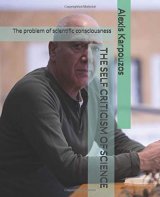THE SELF-CRITICISM OF SCIENCE - ALEXIS KARPOUZOS
The metaphysical and idealist distinction between the ‘formal-logical’ and the ‘strictly psycho-spiritual’ falls in the wider Western metaphysical-idealist tradition that discerns the material from the spiritual, the rationalistic from the temperamental, technique from art, Theory from Praxis, the collective from the individual. This dis- tinction results from the greek-western thought and its positive element, which presupposed that Being is onto- logically defined, is governed by an immanent rationality; that it is full in meaning and allows for a thorough verifi- cation and determination from the human mind, itself having the analogous characteristics. From this it is suggested that the world, as it is explained within the context of natural philosophy, is not determined as it was viewed throughout the greek-western metaphysical tradition and the technique as a totally ra- tional activity is not able to acquire a profound knowledge of its ‘subject’. In contrary, the world ‘is’ chaos
Genre: Essay, Journals, Philosophy, Religion, Spirituality & New Age, Science, Self help
Genre: Essay, Journals, Philosophy, Religion, Spirituality & New Age, Science, Self help
- Year:
- 2012
- 528 Views
Alexis karpouzos is not a systematic philosopher, but the worldview behind his works and his ideas are complex as well as original. He developed a spiritual humanism that connected ancient east philosophical ideas with modern Western scientific ideas and gave them his own original twist. He believe that human beings could fulfil their potential and find freedom and fulfilment through love, knowledge and freedom, if they succeeded in connecting their narrow self with the universal Being.
Translation
Translate and read this book in other languages:
Select another language:
- - Select -
- 简体中文 (Chinese - Simplified)
- 繁體中文 (Chinese - Traditional)
- Español (Spanish)
- Esperanto (Esperanto)
- 日本語 (Japanese)
- Português (Portuguese)
- Deutsch (German)
- العربية (Arabic)
- Français (French)
- Русский (Russian)
- ಕನ್ನಡ (Kannada)
- 한국어 (Korean)
- עברית (Hebrew)
- Gaeilge (Irish)
- Українська (Ukrainian)
- اردو (Urdu)
- Magyar (Hungarian)
- मानक हिन्दी (Hindi)
- Indonesia (Indonesian)
- Italiano (Italian)
- தமிழ் (Tamil)
- Türkçe (Turkish)
- తెలుగు (Telugu)
- ภาษาไทย (Thai)
- Tiếng Việt (Vietnamese)
- Čeština (Czech)
- Polski (Polish)
- Bahasa Indonesia (Indonesian)
- Românește (Romanian)
- Nederlands (Dutch)
- Ελληνικά (Greek)
- Latinum (Latin)
- Svenska (Swedish)
- Dansk (Danish)
- Suomi (Finnish)
- فارسی (Persian)
- ייִדיש (Yiddish)
- հայերեն (Armenian)
- Norsk (Norwegian)
- English (English)
Citation
Use the citation below to add this book to your bibliography:
Style:MLAChicagoAPA
"THE SELF-CRITICISM OF SCIENCE - ALEXIS KARPOUZOS Books." Literature.com. STANDS4 LLC, 2024. Web. 26 Apr. 2024. <https://www.literature.com/book/the_self-criticism_of_science_-_alexis_karpouzos_1618>.




Discuss this THE SELF-CRITICISM OF SCIENCE - ALEXIS KARPOUZOS book with the community:
Report Comment
We're doing our best to make sure our content is useful, accurate and safe.
If by any chance you spot an inappropriate comment while navigating through our website please use this form to let us know, and we'll take care of it shortly.
Attachment
You need to be logged in to favorite.
Log In